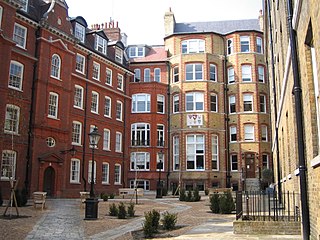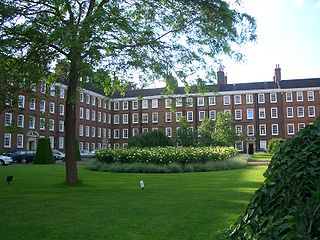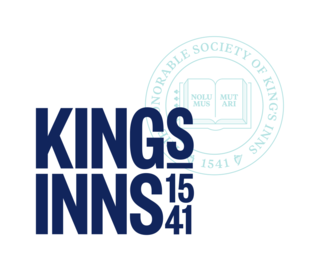
A barrister is a type of lawyer in common law jurisdictions. Barristers mostly specialise in courtroom advocacy and litigation. Their tasks include arguing cases in courts and tribunals, drafting legal pleadings, researching the law and giving legal opinions.

A hotel is an establishment that provides paid lodging on a short-term basis. Facilities provided inside a hotel room may range from a modest-quality mattress in a small room to large suites with bigger, higher-quality beds, a dresser, a refrigerator, and other kitchen facilities, upholstered chairs, a television, and en-suite bathrooms. Small, lower-priced hotels may offer only the most basic guest services and facilities. Larger, higher-priced hotels may provide additional guest facilities such as a swimming pool, a business center with computers, printers, and other office equipment, childcare, conference and event facilities, tennis or basketball courts, gymnasium, restaurants, day spa, and social function services. Hotel rooms are usually numbered to allow guests to identify their room. Some boutique, high-end hotels have custom decorated rooms. Some hotels offer meals as part of a room and board arrangement. In Japan, capsule hotels provide a tiny room suitable only for sleeping and shared bathroom facilities.

Inns are generally establishments or buildings where travelers can seek lodging, and usually, food and drink. Inns are typically located in the country or along a highway. Before the advent of motorized transportation, they also provided accommodation for horses.

A pub is in several countries a drinking establishment licensed to serve alcoholic drinks for consumption on the premises. The term first appeared in England in the late 17th century, to differentiate private houses from those open to the public as alehouses, taverns and inns. Today, there is no strict definition, but CAMRA states a pub has four characteristics:
- is open to the public without membership or residency
- serves draught beer or cider without requiring food be consumed
- has at least one indoor area not laid out for meals
- allows drinks to be bought at a bar

The Honourable Society of the Middle Temple, commonly known simply as Middle Temple, is one of the four Inns of Court entitled to call their members to the English Bar as barristers, the others being the Inner Temple, Gray's Inn and Lincoln's Inn. It is located in the wider Temple area of London, near the Royal Courts of Justice, and within the City of London. As a liberty, it functions largely as an independent local government authority.

The Inn is a river in Switzerland, Austria and Germany. The 518 km (322 mi) long river is a right tributary of the Danube, being the third largest tributary of the Danube by discharge. The highest point of its drainage basin is the summit of Piz Bernina at 4,049 m (13,284 ft). The Engadine, the valley of the En, is the only Swiss valley whose waters end up in the Black Sea.

The Honourable Society of Lincoln's Inn is one of the four Inns of Court in London to which barristers of England and Wales belong and where they are called to the Bar.

The Honourable Society of the Inner Temple, commonly known as the Inner Temple, is one of the four Inns of Court and is a professional association for barristers and judges. To be called to the Bar and practise as a barrister in England and Wales, a person must belong to one of these Inns. It is located in the wider Temple area, near the Royal Courts of Justice, and within the City of London. As a liberty, it functions largely as an independent local government authority.

The Honourable Society of Gray's Inn, commonly known as Gray's Inn, is one of the four Inns of Court in London. To be called to the bar in order to practise as a barrister in England and Wales, an individual must belong to one of these inns. Located at the intersection of High Holborn and Gray's Inn Road in Central London, the Inn is a professional body and provides office and some residential accommodation for barristers. It is ruled by a governing council called "Pension", made up of the Masters of the Bench and led by the Treasurer, who is elected to serve a one-year term. The Inn is known for its gardens, which have existed since at least 1597.

The Inns of Court in London are the professional associations for barristers in England and Wales. There are four Inns of Court: Gray's Inn, Lincoln's Inn, Inner Temple and Middle Temple.

The George Inn, or The George, is a public house established in the medieval period on Borough High Street in Southwark, London, owned and leased by the National Trust. It is located about 250 metres (820 ft) from the south side of the River Thames near London Bridge and is the only surviving galleried London coaching inn.
An international nonproprietary name (INN) is an official generic and nonproprietary name given to a pharmaceutical drug or an active ingredient. INNs are intended to make communication more precise by providing a unique standard name for each active ingredient, to avoid prescribing errors. The INN system has been coordinated by the World Health Organization (WHO) since 1953.
Holiday Inn is a chain of hotels based in Atlanta, Georgia and a brand of IHG Hotels & Resorts. The chain was founded in 1952 by Kemmons Wilson (1913–2003), who opened the first location in Memphis, Tennessee. The chain was a division of Bass Brewery from 1988-2000, Six Continents from 2000-03, and IHG Hotels & Resorts since 2003. It operates hotels under the names Holiday Inn, Holiday Inn Express, Holiday Inn Club Vacations, and Holiday Inn Resorts. As of 2018, Holiday Inn has hotels at over 1,100 locations.

The Honorable Society of King's Inns is the "Inn of Court" for the Bar of Ireland. Established in 1541, King's Inns is Ireland's oldest school of law and one of Ireland's significant historical environments.

Derek John McInnes is a Scottish professional football manager and former player who is the manager of Scottish Premiership club Kilmarnock. He featured prominently for Greenock Morton, Rangers, West Bromwich Albion and Dundee United during his playing career. He won two caps for the Scotland national football team while with West Brom.

Gavin Miles McInnes is a Canadian writer, podcaster, far-right commentator and founder of the Proud Boys. He is the host of Get Off My Lawn with Gavin McInnes on his website Censored.TV. He co-founded Vice magazine in 1994 at the age of 24 and relocated to the United States in 2001. In 2016 he founded the Proud Boys, an American far-right militant organization which was designated a terrorist group in Canada and New Zealand after he left the group. McInnes has been described as promoting violence against political opponents but has claimed that he has only supported political violence in self-defense and that he is not far-right or a supporter of fascism, instead identifying as "a fiscal conservative and libertarian".
Premier Inn Limited is a British limited service hotel chain and the UK's largest hotel brand, with more than 800 hotels, with over 72,000 rooms. It operates hotels in a variety of locations including city centres, suburbs and airports, competing with the likes of Travelodge and Ibis hotels. The company was established by Whitbread as Travel Inn in 1987, to compete with Travelodge. Whitbread bought Premier Lodge in July 2004 and merged it with Travel Inn to form the current business under the name Premier Travel Inn, which was then shortened to the current name in October 2007. Premier Inn accounts for 70% of Whitbread's earnings.

A bencher or Master of the Bench is a senior member of an Inn of Court in England and Wales or the Inns of Court in Northern Ireland, or the Honorable Society of King's Inns in Ireland. Benchers hold office for life once elected. A bencher can be elected while still a barrister, in recognition of the contribution that the barrister has made to the life of the Inn or to the law. Others become benchers as a matter of course when appointed as a High Court judge. The Inn may elect non-members as honorary benchers – for example, distinguished judges and lawyers from other countries, eminent non-lawyers or members of the British Royal Family, who become known as "Royal Benchers" once elected.
Drug nomenclature is the systematic naming of drugs, especially pharmaceutical drugs. In the majority of circumstances, drugs have 3 types of names: chemical names, the most important of which is the IUPAC name; generic or nonproprietary names, the most important of which are international nonproprietary names (INNs); and trade names, which are brand names. Under the INN system, generic names for drugs are constructed out of affixes and stems that classify the drugs into useful categories while keeping related names distinguishable. A marketed drug might also have a company code or compound code.

Historic Hotels of America is a program of the National Trust for Historic Preservation that was founded in 1989 with 32 charter members; the program accepts nominations and identifies hotels in the United States that have maintained their authenticity, sense of place, and architectural integrity.















